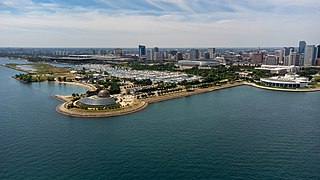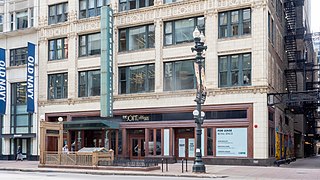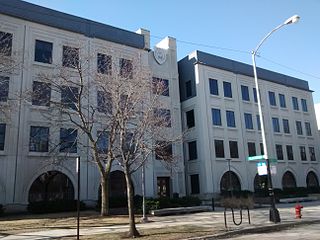
The Newberry Library is an independent research library, specializing in the humanities. It is located in Chicago, Illinois, and has been free and open to the public since 1887. The Newberry fosters a deeper understanding of our world by inspiring research and learning in the humanities and encouraging conversations about ideas that matter. Its mission is rooted in a growing and accessible collection of rare and historical materials.

The Illinois Medical District (IMD) is a special-use zoning district two miles west of the Loop in Chicago, Illinois. The Illinois Medical District consists of 560 acres of medical research facilities, labs, a biotechnology business incubator, a raw development area, four major hospitals, two medical universities, and more than 40 health care related facilities. The IMD has more than 29,000 employees, 50,000 daily visitors and generates $3.4 billion in economic opportunity. The Illinois Medical District is the largest medical district in North America, and has the most diverse patient population on the continent.

Museum Campus is a 57-acre (23 ha) park in Chicago facing Lake Michigan in Grant Park. It encompasses five of the city's major attractions: the Adler Planetarium, America's first planetarium; the Shedd Aquarium; the Field Museum of Natural History. It is adjacent to Soldier Field, home of the NFL Chicago Bears football team; and the Lakeside Center of McCormick Place and to Northerly Island park and Burnham Harbor.

The Pritzker School of Medicine is the M.D.-granting unit of the Biological Sciences Division of the University of Chicago. It is located on the university's main campus in the historic Hyde Park neighborhood of Chicago and matriculated its first class in 1927. The medical school offers a full-time Doctor of Medicine degree program, joint degree programs, graduate medical education, and continuing medical education.
The University of Chicago Divinity School is a private graduate institution at the University of Chicago dedicated to the training of academics and clergy across religious boundaries. Formed under Baptist auspices, the school today lacks any sectarian affiliations.
The Center for Middle Eastern Studies at the University of Chicago is a National Resource Center for the study of a region extending from Morocco in the West to Kazakhstan in the East. As a result, this Area Center covers some of the most important and controversial regions - including North Africa, the Middle East, and Central Asia. Prior to the Center's formation, scholars originally received funding administered by Title VI of the US Department of Defense's National Defense Education Act. The University of Chicago did not form its center until 1965, well after the administration of funding was moved to the US Department of Education by President John F. Kennedy. This area center consistently ranks in the highest tier of those dealing with Middle Eastern studies in the United States according to US Department of Education and external reviews. In the most recent competition for Department of Education's Title VI funds in 2014, the Center was awarded both NRC and FLAS grants, which support courses, extracurricular programs, educational outreach, and graduate student fellowships.
Established in 1988, the Consortium of Humanities Centers and Institutes serves as a site for the discussion of issues germane to the fostering of cross-disciplinary activity and as a network for the circulation of information and the sharing of resources within the humanities and interpretive social sciences. CHCI has a membership of over 200 centers and institutes that are remarkably diverse in size and scope and are located in the United States, Australia, Canada, China, Korea, Finland, Taiwan, Ireland, United Kingdom, and other countries.
The Franklin Humanities Institute (FHI) is an interdisciplinary humanities center at Duke University dedicated to supporting humanities, arts, and social science research and teaching. Named after the prominent African American historian and civil rights activist John Hope Franklin, who retired from Duke in 1985 as the James B. Duke professor of history, the institute has also made a commitment to promote scholarship that enhances social equity, especially through research on race and ethnicity.
Morton College is a public community college in Cicero, Illinois. It is the second oldest community college in the state. While the campus itself was constructed in 1975, the college was established in 1924. Before the construction of the campus, the college was housed in the same building as the local high school. It is named after Julius Sterling Morton, a Nebraska newspaper editor and politician who served as President Grover Cleveland's Secretary of Agriculture.

The Gene Siskel Film Center, formerly The Film Center of the School of the Art Institute of Chicago and commonly referred to as The Film Center or The Gene Siskel, is the cinematheque attached to The School of the Art Institute of Chicago. It is named after popular film critic Gene Siskel.

The Ryerson & Burnham Libraries are the art and architecture research collection of the Art Institute of Chicago. The libraries cover all periods with extensive holdings in the areas of 18th-, 19th- and 20th-century architecture and 19th-century painting, prints, drawings, and decorative arts. A variety of materials important to scholarly research includes architects' diaries, correspondence, job files, photographs, sketchbooks, scrapbooks, articles, transcripts, and personal papers.
Chicago High School for the Arts (ChiArts) is a public four–year college preparatory visual and performing arts high school located in the West Town community area, in Chicago, Illinois, United States. Operated by the Chicago Public Schools district, The school opened for the 2009–10 school year.

The University of Chicago Graham School of Continuing Liberal and Professional Studies is one of eight professionals schools of the University of Chicago. The Graham School's focus is on part-time and flexible programs of study.

University of Chicago Library is the library system of the University of Chicago, located on the university's campus in Chicago, Illinois, United States. It is the ninth largest academic library in North America, with over 11.9 million volumes as of 2019. The library also holds 65,330 linear feet of archives and manuscripts and 245 terabytes of born-digital archives, digitized collections, and research data.

The Gary Becker Milton Friedman Institute for Research in Economics is a collaborative, cross-disciplinary center for research in economics. The institute was established at the University of Chicago in June 2011. It brought together the activities of two formerly independent economic research centers at the university: the Milton Friedman Institute for Research in Economics and the Becker Center on Chicago Price Theory.
The Center for 21st Century Studies (C21) is an interdisciplinary postdoctoral research institute and University of Wisconsin Center of Excellence located on the University of Wisconsin–Milwaukee (UWM) campus. C21 is dedicated to supporting the study of contemporary culture within the arts, humanities, and social sciences of all fields, and it also sponsors and supports the creation and deployment of 21st-century modes of research, analysis, and representation.
Youth Connection Charter School (YCCS) is a charter school in Chicago, Illinois. Founded in 1997 it is the only charter school in Illinois that targets dropouts and other at-risk students. YCCS serves over 3,500 students through 17 campuses throughout Chicago.
Gregg Lambert is an American philosopher and literary theorist, who writes on Baroque and Neo-Baroque cultural history, critical theory and film, the contemporary university, and especially on the philosophers Gilles Deleuze and Jacques Derrida. Between 2008 and 2014, he was the founding director of Syracuse University Humanities Center, where he currently holds the distinguished research appointment as Dean's Professor of Humanities, and was Principal Investigator and Founding Director of the Central New York Humanities Corridor between 2008-2019.CNY Corridor
The Neubauer Collegium for Culture and Society is a collaborative research center located on the campus of the University of Chicago in Chicago, Illinois.
Michael P. Steinberg is the Barnaby Conrad and Mary Critchfield Keeney Professor of History, and a professor of music and German studies at Brown University. He was the president of the American Academy in Berlin from March 2016 to August 2018. Steinberg was previously the vice provost for the arts at Brown University. Steinberg has been a member of the executive board of the Consortium of Humanities Centers and Institutes (CHCI) and served as founding director of the Cogut Center for the Humanities at Brown, from 2005 to 2015. Between 2009 and 2013, he served as dramaturg on a joint production of Richard Wagner’s Ring of the Nibelung for the Berlin State Opera and the Teatro alla Scala, Milan.









